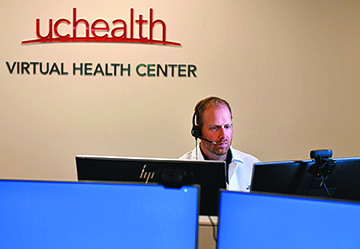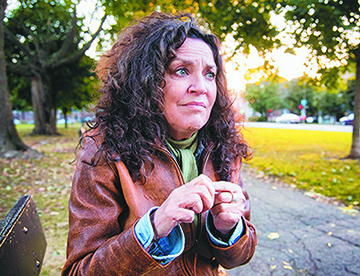Advice On Testing, Seeing A Medical Provider From Home; Tips To Stop Mass Anxiety And Panicky Behavior From Spreading
by Glen Richardson
Seemingly facing a widening coronavirus pandemic tagged as COVID-19, dark spirits are transfixing Valley residents as authorized restrictions have ignited a near-shutdown of all activity and is upending daily life. The contagion is the perfect storm of an unknown threat mixing in with social media and news channels to generate hysteria.

Like everyone, the Chronicle takes the virus seriously but also recognizes it should be seen in perspective. Consider these facts: As of March 18 there had been 154 coronavirus deaths nationwide. During the same period there were 2,900 flu deaths in the U.S. The number of COVID-19 cases nationwide was over 10,000 compared to between 30 and 40 million flu cases with 30,000-50,000 hospitalizations. In Colorado there have been 216 coronavirus cases compared to 3,391 hospitalized flu cases.
Despite reports coronavirus is a greater threat to the elderly, Colorado’s new COVID-19 website reveals as of March 18 that 44.34% of cases were age 50 and above versus 55.66% under 50 years of age.
What To Do?
The virus outbreak should, of course, be taken seriously. Nevertheless, the exaggerated response created by the current panic is having negative consequences for our health and the health of community businesses. To get answers, we turn to UCHealth medical providers for information and guidance. Moreover, is this mass anxiety and panicky behavior real and what should we do about it?

Foremost, medical providers can help you figure out if you need to be tested for coronavirus. UCHealth’s Virtual Urgent Care is open to anyone in Colorado including those who don’t have insurance. What should you do if you have symptoms like a fever, cough or shortness of breath? For those who have general questions about coronavirus, or want information about testing, the best place to get help is through Glendale-based Colorado Department of Public Health & Environment at 303-389-1687 or email cohelp@rmpdc.org. For patients who want to see a medical provider from the privacy of home, an online visit through UC-Health’s Virtual Urgent Care can be one of the easiest, safest ways to get help.
“COVID-19 is quite infectious, so if you can stay home and get medical advice, that gives you two advantages. First, if you’re sick, you’re not going to be bringing your illness into a doctor’s office or a hospital. Second, you won’t be exposed to other patients,” explains Dr. Chris Davis, an expert in emergency medicine and infectious diseases, and Medical Director for UCHealth’s Virtual Urgent Care.
Is A Test Needed?
“If you’re worried and you have any risk factors, you can see a provider. If you need a test, then we can tell you what to do and the closest place to get tested,” Davis adds.

Patients using Virtual Urgent Care do not need to be a current UCHealth patient and don’t need insurance. Anyone in Colorado, including visitors to the state, can use the service. Insurance typically covers the visit, but for those who don’t have insurance,
there’s a $49 flat fee. Moreover, the Virtual Urgent Care providers are now trained on how to help patients determine if they are at risk for COVID-19.
“We’re looking for symptoms and also for a travel history. Have you recently been to the five countries where the outbreaks are the worst: China, Italy, Iran, South Korea or Japan? Or, have you been to California, Washington State, Florida, New York, places that have ongoing cases of community transmission?” Davis states.
Same Day Appointment
Many patients won’t need additional care beyond their online visit, Davis indicates. But for those who do need to be tested for COVID-19 or to go to an ER for immediate follow-up care, the fee for the Virtual Urgent Care appointment will be waived. Davis points out that it’s reassuring for patients to get same-day appointments with Colorado health experts.
“This is a pretty fast-moving situation. It’s nice to have a dedicated group of providers who are keeping track of this coronavirus outbreak on a daily basis,” Davis continues. There’s no referral necessary.
Anyone in Colorado can create an account through My Health Connect and request an appointment online for an appointment. “What makes this so great and convenient is the setting. When you’re dealing with a pandemic, you can get your questions answered without having to leave your home,” Davis continues. “If you’re worried about being exposed or exposing others, this is a great option.”
Anxiety Attack
Coronavirus anxiety has spurred people to hoard everything from toilet paper to canned tuna. Hand sanitizer has been sold out for weeks, spurring nervous neighbors to share tips on Nextdoor about how to make their own sanitizer, only to discover on fruitless trips to the pharmacy that the key ingredient — alcohol — is also sold out. Add worries about the tanking stock market to spookily empty store shelves and we are witnessing a full-blown case of coronavirus anxiety.

According to Psychologist Justin Ross, it’s no surprise that mass anxiety and panicky behavior are spreading. Ross, who has a doctorate in psychology and practices at the UCHealth Integrative Medicine Center in Stapleton says anxiety is a natural response now because the coronavirus outbreak is feeding the three key ingredients that cause anxiety: Unpredictability, Lack of control, plus it’s a threat to the people or things we value.
Ross said anxiety can be a healthy response during times of stress. “In many ways anxiety serves an adaptive, healthy response when something we value dearly is threatened or perceived to be threatened,” Ross explains. “The problem is when the anxiety response runs amok and spins out of control. That’s when it can cause a lot of problems for people.”
Simple Stress Steps
Ross says it’s clear that anxiety about the coronavirus outbreak is causing problems for many. “The current level of uncertainty and a felt sense of lacking control with this virus has led us to buy things unnecessarily and excessively checking news and social media. We want to feel like we have the ability to control our lives. We want information and we want products that align with our vision for safety and control,” he explains.

While it’s not very helpful during legitimate times of stress to give people pat responses like: “calm down, don’t panic,” or “don’t worry,” Ross suggests these simple steps: Limit
your exposure to news and social media. Plan to check your news sources or social media feeds just twice a day. Ross strongly recommends limiting exposure to social media since a friend’s post — which may not even be accurate — can trigger worries for you. Anxiety essentially can be contagious. Reduce the contagion by skipping the updates.
Focus on controlling what you can control, he urges. A person cannot control how widely the coronavirus outbreak will spread. We can’t control if our child’s school will close or if an important work conference will get canceled or if our 401K retirement savings shrinks. So, he advises people to focus on the simple powers we do have. “We can wash our hands. We can take precautions,” he says. “We can give ourselves the best chance of staying healthy.”
For more information, visit uchealth.org
